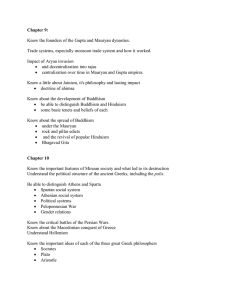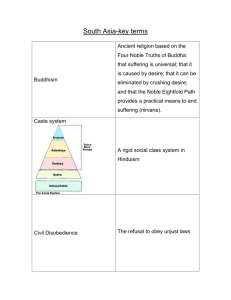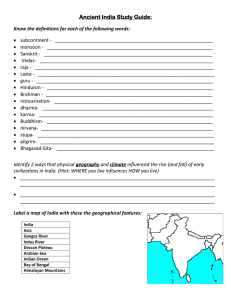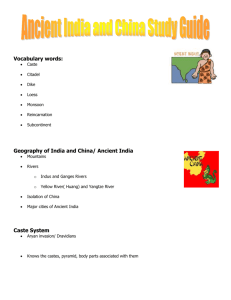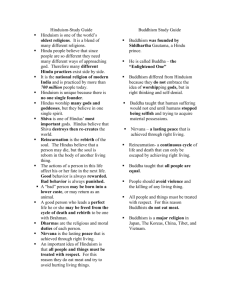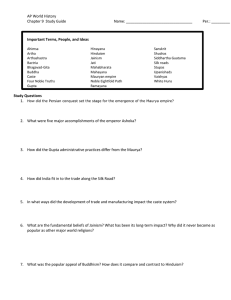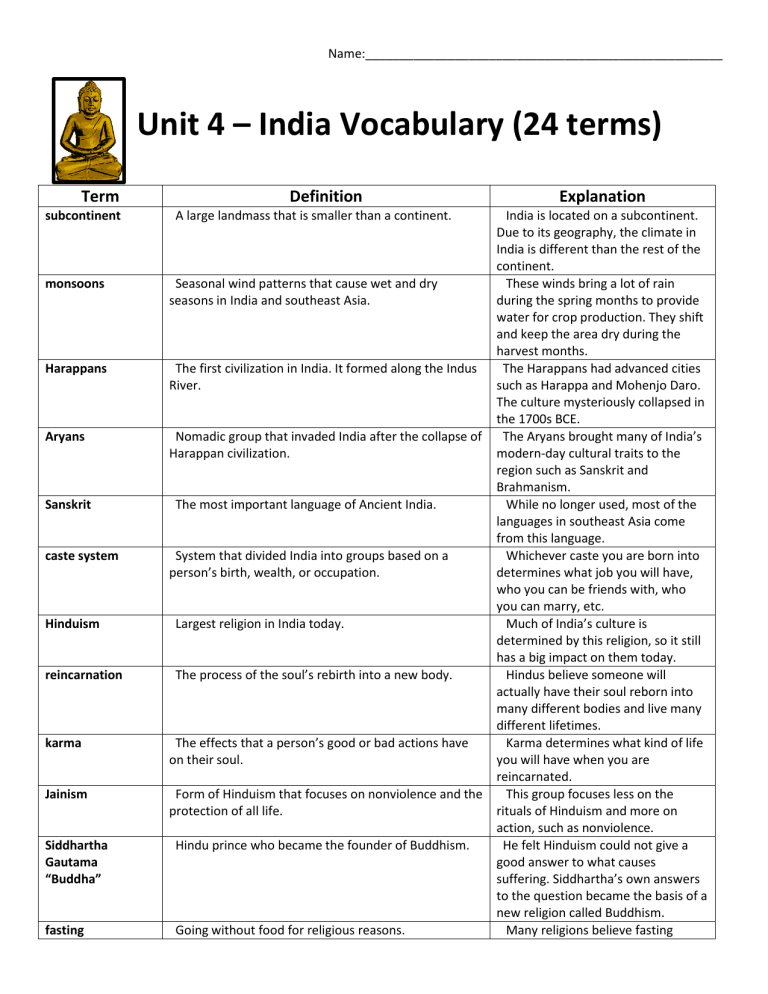
Name:____________________________________________________ Unit 4 – India Vocabulary (24 terms) Term subcontinent Definition A large landmass that is smaller than a continent. monsoons Seasonal wind patterns that cause wet and dry seasons in India and southeast Asia. Harappans The first civilization in India. It formed along the Indus River. Aryans Nomadic group that invaded India after the collapse of Harappan civilization. Sanskrit caste system The most important language of Ancient India. System that divided India into groups based on a person’s birth, wealth, or occupation. Hinduism Largest religion in India today. reincarnation The process of the soul’s rebirth into a new body. karma The effects that a person’s good or bad actions have on their soul. Jainism Form of Hinduism that focuses on nonviolence and the protection of all life. Siddhartha Gautama “Buddha” Hindu prince who became the founder of Buddhism. fasting Going without food for religious reasons. Explanation India is located on a subcontinent. Due to its geography, the climate in India is different than the rest of the continent. These winds bring a lot of rain during the spring months to provide water for crop production. They shift and keep the area dry during the harvest months. The Harappans had advanced cities such as Harappa and Mohenjo Daro. The culture mysteriously collapsed in the 1700s BCE. The Aryans brought many of India’s modern-day cultural traits to the region such as Sanskrit and Brahmanism. While no longer used, most of the languages in southeast Asia come from this language. Whichever caste you are born into determines what job you will have, who you can be friends with, who you can marry, etc. Much of India’s culture is determined by this religion, so it still has a big impact on them today. Hindus believe someone will actually have their soul reborn into many different bodies and live many different lifetimes. Karma determines what kind of life you will have when you are reincarnated. This group focuses less on the rituals of Hinduism and more on action, such as nonviolence. He felt Hinduism could not give a good answer to what causes suffering. Siddhartha’s own answers to the question became the basis of a new religion called Buddhism. Many religions believe fasting meditation The focusing of the mind on spiritual ideas. Buddhism Religion from India based on the teachings of Buddha. nirvana A state of perfect peace. The Eightfold Path Process by which Buddhist seek out and attain Enlightenment and reach nirvana. Candragupta Maurya Military leader who first united most of India into the Mauryan Empire. missionaries People who travel to other land to spread religious ideas. Asoka (Ashoka) Maurya Most powerful emperor of the Mauryan Empire. Converted to Buddhism after the Battle of Kalinga. Candra Gupta II First emperor of the Gupta Empire in India. alloys Mixtures of two or more metals. Hindu-Arabic numerals The numbering system used in our culture today. inoculation Injecting a person with a small dose of a disease to help the person’s body build an immunity to the disease. astronomy The study of stars and planets. shows how serious someone is about getting an answer from their god or gods. Hindus use meditation to focus the mind’s power on one issue. They also use it to try to “see through the illusion of the world.” Greatly changed the culture and beliefs in India. Started in India, but spread to China, Japan, Korea, and many other Asian countries. Reaching nirvana allows Buddhists to escape the process of reincarnation. All Buddhist want to achieve nirvana through Enlightenment. The Eightfold Path guides Buddhists in their religion. It helps them achieve nirvana. He began uniting the different parts of India helping give it one common culture. These are the people that spread religions into other civilizations. They helped spread Buddhism outside of India. Was emperor when India was its most powerful. Helped spread Buddhism throughout India and southeast Asia by paying for missionaries. The Gupta Empire made Hinduism the most dominant religion in India once again and brought back the caste system. By mixing metals together, India learned how to make better armor and weapons. Hindus finished off the common sense of numbering by adding a symbol that stood for nothing (0). This made modern math possible. This is still used today and keeps us from getting certain viruses like chicken pox and the measles. India was one of the first to identify all nine planets, identify the sun as a star, and realize the sun was the center of the solar system, not Earth.
